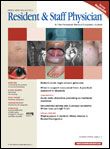Publication
Article
Resident & Staff Physician®
How one resident can make a difference: ACGME policy changes to resident and fellow benefits
Dear Colleague,
Upon graduating from medical school, we all believe that we are equipped with the skills necessary to succeed in residency. We are wide-eyed, optimistic, and excited to finally be "doctors." Once we become residents and fellows and start treating patients, we realize that a significant proportion are uninsured. Imagine how surprising it would be for you to discover after arriving at your new residency or fellow program that you are also one of those patients, at least for the next 30 to 90 days.
It is ironic to be in a teaching hospital with hundreds of doctors, nurses, and testing facilities, yet not be able to take advantage of these resources without incurring significant financial hardship. This is the scenario that many residents and fellows have faced for the past several years in programs across the country.
In 2005, a psychiatry resident at Washington University in Saint Louis, Missouri, realized that many of her peers in other programs had this problem, and she decided to do something about it. In 2006, the Resident and Fellow Section of the Missouri State Medical Association wrote a resolution regarding the need to address this issue, entitled "Eliminating Benefits Waiting Periods for Residents and Fellows." The resolution described discrepancies in the provision of health, dental, and vision benefits, as well as life and disability insurance, between various Graduate Medical Education (GME) training institutions.
Although the majority of GME training institutions provide benefits to physician trainees starting on the first day of employment, some impose a 30- to 90-day waiting period before activating benefits. The Accreditation Council on Graduate Medical Education (ACGME) requires GME programs to inform prospective residents and fellows about these benefit delays, but many do not learn about their lack of coverage until orientation, which does not provide enough time to fill this coverage gap.
Recognizing that this issue was not specific to Missouri but instead affected residents and fellows throughout the United States, the Missouri resolution was submitted to the Resident and Fellow Section of the American Medical Association (AMA-RFS) and forwarded immediately to the AMA House of Delegates. Overwhelmingly, physicians and medical students attending the 2006 annual meeting realized the importance of this issue. While waiting periods make sense in the business world, where the highest rates of attrition are during the early months of employment, residents and fellows are not average employees. Quitting a postgraduate training program is not an option for most physicians; thus, the attrition rate for residents and fellows is extremely low.
Coverage for such benefits should begin upon the first recognized day of their respective programs, unless statute or regulation requires a later date to begin coverage.
The resolution became an AMA initiative, the issue was studied, and the AMA presented its findings to the ACGME. The AMA worked with the ACGME to update guidelines recommending that all programs provide coverage commencing on the first day of GME training. The amended institutional requirements for health and disability insurance are as follows (new language is italicized): "The Sponsoring Institution must provide hospital and health insurance benefits for the residents and their families. The Sponsoring Institution must also provide access to insurance to all residents for disabilities resulting from activities that are part of the educational program." All residency programs seeking to maintain ACGME accreditation are expected to comply with this provision.
This achievement illustrates how one resident can make a difference and improve the quality of life for thousands of current and future physicians-in-training. Every year, residents and fellows have the opportunity to share educational, training-related, and policy-specific experiences that warrant greater discussion and national attention. The policy-making process of the AMA-RFS is one of the most powerful benefits of membership. It provides physicians-in-training with the opportunity to improve their work environment, influence GME training, and strengthen the practice of medicine in general.
Michelle Powers, MD, MBA
Alternate Delegate, American Medical Association House of Delegates
Governing Council, American Medical Association Resident and Fellow Section
Chair, Missouri State Medical Association Resident and Fellow Section
